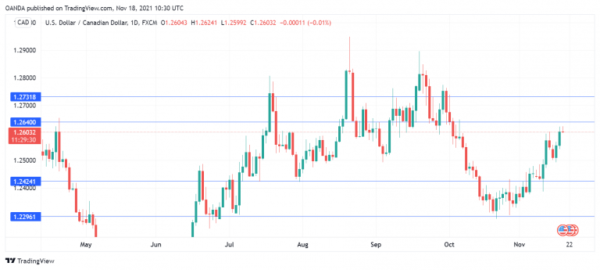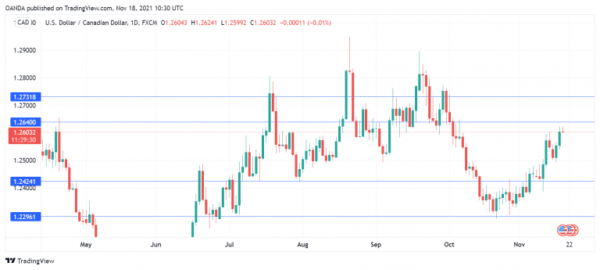The Canadian dollar is flat in the European session. Currently, USD/CAD is trading at 1.2603, down 0.01%. On Wednesday, the Canadian dollar fell by 0.40% as USD/CAD pushed into 1.26-territory.
How will BoC deal with surging inflation?
The Federal Reserve and BoE are scrambling to deal with surging inflation, and let’s not leave the Bank of Canada out of that honourable list. October inflation accelerated, as expected. CPI climbed 4.7% y/y, matching the consensus and up from 4.4% in September. Trimmed CPI, which excludes energy, rose 3.3%, matching the gain in September. The headline reading is the highest since 2003, and the markets are watching to see how the BoC reacts. Earlier this week, Governor Tiff Macklem said that it would not raise the benchmark interest rate until “economic slack is absorbed”, which he said had not yet occurred but was getting closer. Macklem sought to reassure the markets that inflation will be kept under control, but with the latest CPI report hitting an 18-year high, investors can be forgiven for not sharing Macklem’s confidence.
We continue to see a disconnect between BoC guidance and market expectations. The BoC has signalled that it may raise rates around mid-2022, but the markets have priced in a hike for March of next year. Something will have to give, and with inflation showing no signs of easing, the central bank may have to bring forward its timeline for a rate hike, which would support the Canadian dollar.
Ahead of the December policy meeting, the Fed will have had a chance to review key inflation data, including the October PCE index, the Fed’s favorite inflation gauge, as well as the November CPI report. These releases could have a significant impact on what moves if any the Fed announces at the December meeting.
USD/CAD Technical
- There is support at 1.2423. Below, there is support at 1.2296
- There is resistance at 1.2641, followed by 1.2732



 Signal2forex.com - Best Forex robots and signals
Signal2forex.com - Best Forex robots and signals




